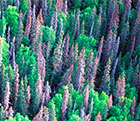Milder winters can’t be blamed for the full extent of recent mountain pine beetle outbreaks in the western United States, according
 to a new study by Dartmouth and U.S. Forest Service researchers. Winters have been warming across the western U.S. states for decades, as overall the coldest winter night has warmed by 4 degrees C since 1960. But that warming trend could only be the primary driver of increasing pine beetle outbreaks in regions where winter temperatures have historically killed most of the beetles, such as in the Middle Rockies, eastern Oregon, and northern Colorado, the study says. Warming is unlikely to have played a major role in other regions since winters were rarely cold enough to kill the beetles, according to the study published in the journal Landscape Ecology. Other factors — including changes in the pine beetles’ seasonal development patterns and forestry practices that have influenced pine density and age — were likely more important, the authors say.
to a new study by Dartmouth and U.S. Forest Service researchers. Winters have been warming across the western U.S. states for decades, as overall the coldest winter night has warmed by 4 degrees C since 1960. But that warming trend could only be the primary driver of increasing pine beetle outbreaks in regions where winter temperatures have historically killed most of the beetles, such as in the Middle Rockies, eastern Oregon, and northern Colorado, the study says. Warming is unlikely to have played a major role in other regions since winters were rarely cold enough to kill the beetles, according to the study published in the journal Landscape Ecology. Other factors — including changes in the pine beetles’ seasonal development patterns and forestry practices that have influenced pine density and age — were likely more important, the authors say.

Pine forest affected by mountain pine beetles